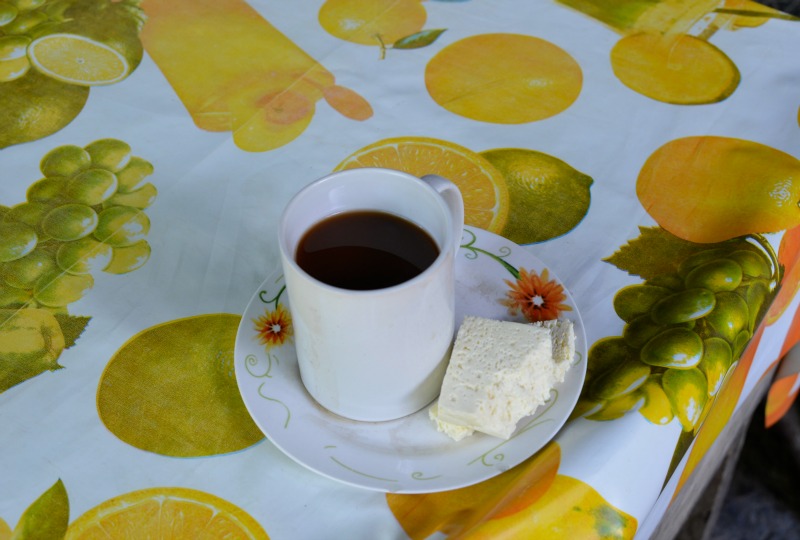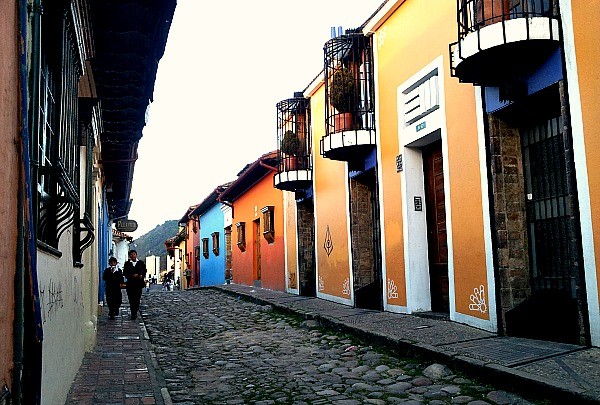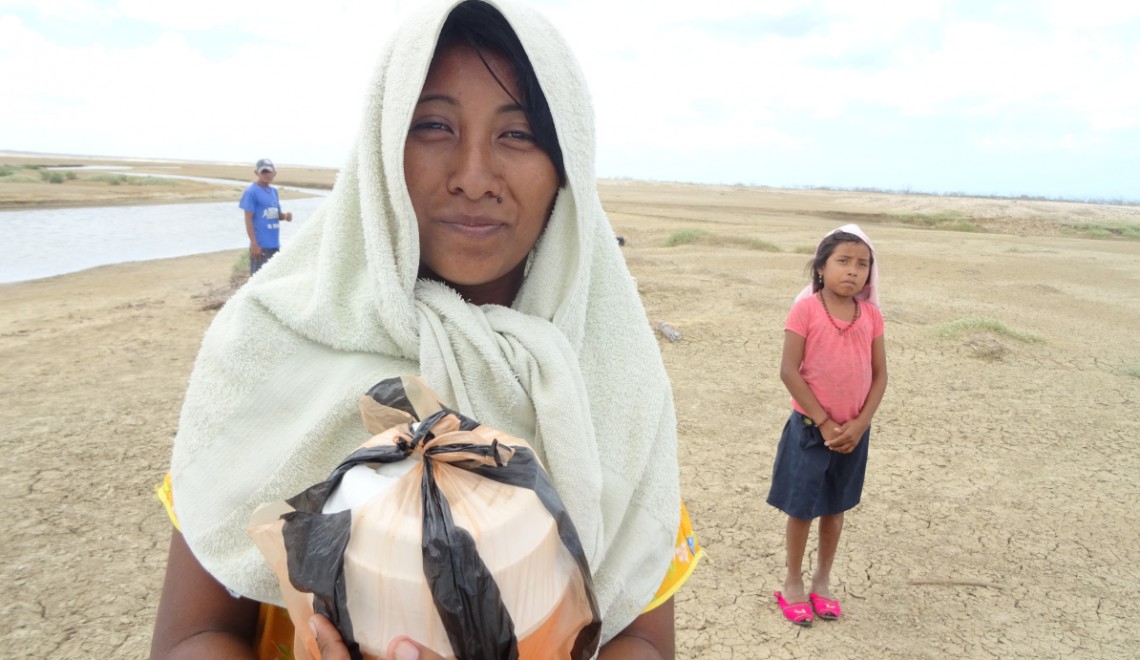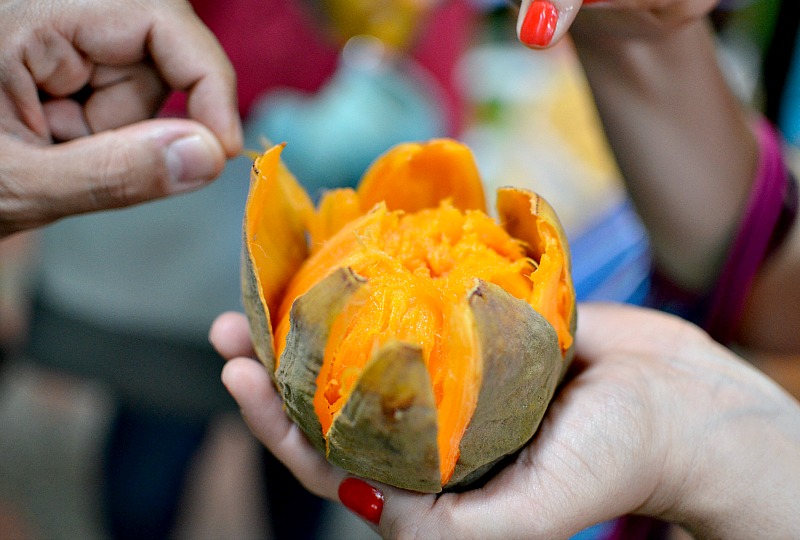
Before I decided to travel Colombia, I was very particular about what I did and didn’t eat.
At one point I was a raw vegan and happily filled my plates with carefully created meals from my pantry stocked with cold-pressed coconut oil, chia seeds, bean sprouts, Indian spices and dried kale chips.
I wandered through green grocers and farmer markets on weekends, where I hand-picked produce from the source. I avoided eggs, dairy products and cuts of meat wrapped in plastic, stocked high in fluro-lit isles at the supermarket.
A happy meal for me was a colourful dish of spinach, a mix of my favourite greens and sprouted legumes, and perhaps even some tofu on the side.
As my eagerly-planned trip to South America grew nearer, I was convinced that my diet would remain as close to how it was in the familiarity and comforts of home.
On my first night living in Colombia I stayed with a local family. I opened the door of their fourth-floor city apartment to the sound of live music being played by a man with a guitar at the kitchen table.
An older woman next to him clapped her hands and sang what I thought was a kind of traditional folk song. Her voice was gentle and sweet and her hands were light as she clapped them together in time with the music.
As I swung open the door, with a heavy backpack in tow and even heavier bags under my eyes proving a long and sleepless flight, the room cheered and said their hellos before going back to their singing and dancing.
The man returned to his guitar, gently plucking at the strings like they were rose petals being picked in unrequited love.
I sat at the kitchen table and despite my eyes begging for rest, my heart wanted to join in. It felt like it was late but after the song had finished and everyone was done with the festivities, it was time to sit down for a meal.
With travelling in South America as a vegan or a vegetarian, there comes some explaining.
En serio? Are you serious? They might say with their blank looks of surprise, waiting for you to tell them you’re just kidding.
Are you trying to lose weight?! They might gasp looking down at your waist, politely adding that you don’t have anything to lose.
It takes some time to explain that you don’t eat meat, or eggs or, god forbid, CHEESE for health reasons, ethical reasons.
I remained vegan on that first night in Colombia, and many nights that followed; I said no to home-cooked meals from people who were willing to share their homes, hearts and their food with me.
But soon enough, I discovered that by offering me their food, they were offering me friendship, love and a piece of their culture, and I had turned it down. I had turned them down.
While my feelings towards the industry of killing for food – the corporate greed, the factory farming and the manner in which animals are killed and treated – remain, I found I was opening myself and my beliefs up to the people around me.
I continued with a vegetarian lifestyle, but accepted anything and everything that was given to me as a gift. I couldn’t turn down these people’s offerings anymore.
I couldn’t look the woman who offered me a spot at her table with her four children in the eye and refuse to eat the food she had prepared especially for me, her guest.
I couldn’t say no to a bowl of Sancocho offered to me by a humble family – a home-cooked recipe that had been passed down from grandmother to grandmother until it reached my friend’s mum.
Over meat stews and fish and a pork steak which was cut right from the pig in front of me, I made friends, earned trust and learned that little bit more about the culture, and the country, I had chosen to adopt.
I had to drawn the line somewhere though:

While I am no longer vegan, I still prepare vegetarian food for myself but I see any dish I am given as an offering and who am I to refuse something as beautiful as that?
What about you? Do your eating habits change while you travel abroad? Let me know.







I’ve wrestled with this issue as well. When I was in Costa Rica is was so easy to be vegetarian or at least pescatarian. Then I lived in Madrid and it was all pork and pork and pork. I decided not to b vegetarian at all. I’m moving back to Madrid and backpacking through Europe so now I am hoping I can maintain my vegetarianism but I don’t want to alienate myself from experiencing the culture. I’m glad I’m not the only one to struggle with this!
You’re definitely not the only one who struggles with this. Good luck!
Agree with above post! It is a constant internal back and forth for me.
Out of anxiety, I even commented on the Bogota video, to which Sarepa led me here.
I was worried about being a veg in South America, but I am more worried about offending the hospitality of the people and immersing myself in the culture. Breaking bread among friends is, after all, the best way to immerse yourself.
Nicely written post, with great perspective.
Your writing style is so peaceful, floaty and poignant. I read your article greedily and was somewhat disappointed when I got to the end. A simple rarity. I completely agree with what you’re saying. I think to most people food is a culture, a way to share but also a heartwarming gift. We too have eaten meat not to offend our gracious hosts but to allow her to GIVE. Thanks for sharing.
Prue
Thanks Prue, it’s definitely one of those tricky situations to grapple with while travelling. I’m enjoying your blog, too. Looking forward to hearing more from you and Rebecca!
“I found I was opening myself and my beliefs up to the people around me”…this nearly made me cry, because it’s happened to me too – and it’s absolutely one of the best things about traveling 🙂
Hi Sarepa,
I struggle with this all the time as a “round-the-world” traveler myself. It’s why I say, I’ll never be vegetarian really. My philosophy: Eat veggie/vegan most of the time. If a nice family kills a chicken that’s been living freely in their backyard and the family killed this chicken for dinner and in your honor…you damn sure better eat it! That’s rude otherwise and that chicken had a good life. It’s all about picking and choosing your battles. It’s ok to be imperfect. It’s all about doing your best and if you feel like you’re being respectful towards those around you by being part of the meal which includes meat, then so be it. Spend the rest of the week eating veggie. EVERY little bit helps. Don’t beat yourself up about it. Eat as consciously as you can and other times just be part of the experience. I eat veggie/vegan 95% of the time. I cheat on fish sometimes, and like I said, I’ll eat a piece of meat or join in when a nice family cooks me food. I feel it’s the right thing to do. So, good luck lady!!! I think you’re doing a great job!
Thanks so much Kendra! It is quite a difficult thing to navigate while travelling abroad, but if something is offered as a gift and with love. Who am I not to take it? 🙂 Happy travels!
I would say meat eating and accommodating guests is part of American culture, too. But would you turn that down? I relate to the feeling you’re experiencing, but I cannot see how that justifies the death of the animals. I’ve had plenty of Americans offer me animals products with “love” and “friendship”. and it’s not any different for other cultures.
Hey Patrick, I agree. And if I was invited to a special meal at someone’s house as a guest, I wouldn’t turn it down there either. Anything that is given as a gift is welcome. I am not against the killing and eating of animals, I just disagree with how they are farmed and treated in that process.
“I am not against the killing and eating of animals, I just disagree with how they are farmed and treated in that process.” – on a practical level, if meat is to be mass-produced (which it is almost everywhere), these two things are pretty much inseparable, no?
Also, on an ethical level I’m not sure this adds up. Why is it okay to use extreme violence against animals (the act of killing them) if they have a ‘good life’? This sounds to me like saying it’s okay to kill a human so long as you don’t torture them beforehand.
In terms of this post and travelling, the dilemma of refusing people is understandable and real; I’ve had it myself. But let’s be careful about what we say about culture. Sharing food is definitely a part of many cultures. But that’s it, the act of sharing food. The people doing the cooking and sharing could replace the meat food with non-meat food and the act of sharing and enjoying the meal together would be the exact same. Eating together is a primarily social process, the exact foods are secondary.
I mean if we say meat-eating is part of these people’s essential *culture*, we’re just essentialising them as people who will only ever eat meat, unlike us European/North Americans whose supposedly more progressive culture allows us to go beyond eating meat. As someone else said, Colombians are open to new things, let’s not essentialise them and their ‘culture’ as exclusively meat eating.
I was born in Colombia but when I turned 16 I decided to finish my education in US. Summer was coming and I told my mom I wanted to go to Colombia amd soent my summer overthere. I knew this was going to be hard because I went vegan in the States and didn’t know what my family and friends’ reaction would be with my new diet. Before I came, I told my parents I was vegan so they wouldn’t be too surprised about it. They were very understanding . However, my mom asked “What are you going to eat here? There’s only meat!” And of course there was only animal products in a country were you eat 4 different kinds of meat only for lunch (bandeja paisa) and don’t forget the egg they also put on top. I started to get worried about it so I immediately started searching for vegan restaurants in Colombia. In my surprise I found many! When I arrived to Colombia, my family was waiting for us and the next day my mom and I went to the grocery store so I could buy food for me. I was very surprised because of all the fruit we had. When I lived in Colombia I didn’t pay attention to all the exotic fruit we had, I only ate apples, bananas, mango, lulo, and passion fruit. So this time I decided to try all the fruit I didn’t when I lived here and so I did. My parents were amazed of how easily I could eat here. Almost all restaurants have a vegetarian option which can be easily adjusted (taking out cheeses, milk, eggs, etc) and I was also amazed that it was so easy to eat as vegan in Colombia. However, I had the biggest obstacle to come, a family reunion. Let me be honest, it was so easy! The staple of our food is rice, potatoes, and corn. You can easily eat this and put the meat aside. Of course, my family asked, the ones that didn’t know, why I didn’t eat the meat and my parents, I didn’t even say it, “she’s doesn’t eat animal products. Can you believe it?!” Amd the , they started to ask questions which I happily answered. My aunt and my sister even started to tried vegetarianism. So you can still try our food like rice, beans, potatoes, etc and be social. You can still make friends and knowing Colombian culture and not eating meat. Plus, at the same time, your sharing this ethical and healthy life to them. Colombians are very open and they love to know and learn new things 🙂
Hi, thanks so much for this….i am thinking to visit Colombia soon but my major issue is veganism. I am vegan and i do not wish to eat animal products even if i am in a foreign country and the locals are being friendly by giving me food…i can still be social and avoid animal products in my opinion. So your post here really helped, its good to know that you did not find any difficulty to be vegan there…One question pls …How do you say ” I am vegan ” and ” No animal products pls ” in your language ? this will really help to avoid any unwanted dishes 🙂 thanks again 🙂
Hi Ruth, that is great to hear. There are loads of fresh fruits and vegetables in Colombia, so you’ll have no problems maintaining your vegan diet while you’re there. I think you’d say – “Soy vegana” for I’m vegan and maybe “No como productos animales” which means I don’t eat animal products. I hope that helps, Ruth. Happy and safe travels!
I agree with sarepa.
Also you might need to specify what animal products are: leche, huevos, queso, crema de leche, caldo de res o pollo (meat broth), yogur, … Make sure to be clear about it and check if you really got a vegan dish 😉 be careful with bread, there’s milk in almost all the bread, i checked. Have a great trip and enjoy the beans, garbanzos, rice, lentils, veggies, potatoes <3, and gorgeous fruit! Have some papaya for me 😉 i miss themso much.
Hi there my dear!
Well this is a quite sad post, I must say. I understand how it is to be visiting someone and not wanting to offend them in any way and just show your gratitude for having you as a guest. I don’t see this as a reason to betray your believes at all though. Being vegan is not something about switching on and off.. it is a moral standpoint that you chose to have, a conscious choice that which cannot really be left behind. I’ve lived in Colombia many years, and in the beginning of this year went back there for 3 months – the first time as a vegan. And i must say that it was not a change to before whatsoever. Always when i was invited somewhere I let my hosts know that I’m vegan, they were always very understanding, i offered my help in the kitchen, brought own dishes sometimes to share… just as i do here in Europe. Also when eating out it is no problem to eat vegan, there is always a vegan option. I also feel like Colombians are very open to this, they have a much closer relationship to nature as most of people I here in my home, they accept it and they are open to try new things.
AND Colombia has the most amazing range of fruits and different vegetables! Being vegan there takes only the same small amount of effort that it takes in the rest of the world. It’s just a question of good communication.
I really hope you give veganism another go and get your actions aligned with your believes…
Have a really good day!
xo
Celia
I completely agree with Celia. I have lived in Mexico, for example, both as a pescetarian (for a little bit) and as a vegetarian, and have come back many times as a vegan, and have never had any kind of moral dilemma in relation to letting people know that I don’t eat meat. Most of my friends already know about my diet. And in order to not offend my hosts, I just let them know BEFORE they prepare a meal (if they’re preparing something for me) that I don’t eat meat. It’s that simple. I understand what you’re talking about, but I personally would get more “teary eyed” about a given animal’s horrible life/death than about saying no to a prepared meal, but that’s me. I understand that not everyone is at the same level of empathy, and that it is easier for some to turn a blind eye to/ explain away animal suffering than it is for others.
Thanks for sharing your experiences and point of view, Lord Catness. I really appreciate it. It’s so important to continue the discussions about these issues.
There are occasions where I can at least comprehend putting lack of social awkwardness over veganism – perhaps a discrete animal product in a baked good for instance.
However, I have trouble believing you were ever vegan at all based on your meat eating descriptions, possibly plant-based for health reasons. I can’t imagine any vegan willingly “eating pork cut from a pig in front of them”. I don’t think I would be able to physically watch that happen, and to picture an ex-“vegan” smiling along with friends while they watch and then eat from it is fantastical, unimaginable.